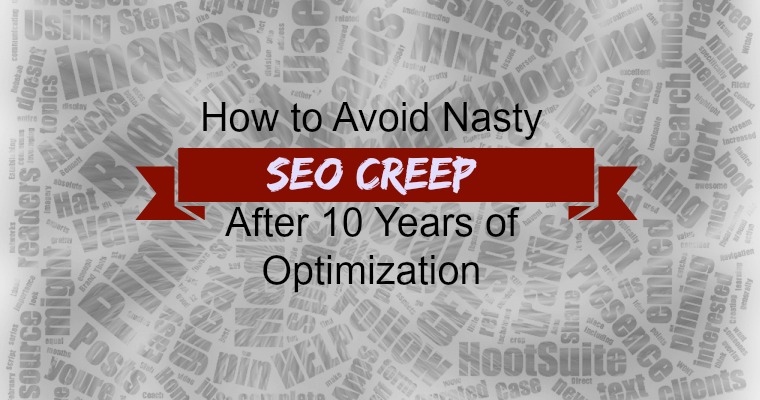A client of ours is working on a pretty dramatic reorganization of their site as they begin the process for developing a new website design. For the past few weeks we’ve been working with them on a strategy for importing the optimized pages over to the new site, knowing that many of the pages will not only be moved around, but some will become obsolete with the new reorganization. On top of that, the client wants to cut down considerably on the amount of text that each page has.
Any web marketing company that has been working on a single client for a number of years runs into this problem, which I like to call “SEO Creep”. As part of any good optimization strategy, we go where the searchers needs are. That often means we are creating pages that are designed to be a match for what searchers want.
Over time, however, businesses change, their focuses change, and searcher behavior changes as well. A page we optimized for a specific group of keywords ten years ago may no longer be the best page for that searcher today. Eventually, you find you have a site with keywords optimized for pages that no longer perform as they should.
How to Avoid SEO Creep

It wasn’t always that way. In years past, SEOs focused on the keywords over the pages themselves. And if you find yourself tsk-tsking over that, it really wasn’t until Google’s Hummingbird algorithm that we all started talking about topic authority over keywords.
So, yes, over 10 years we optimized a lot of pages by adding relevant keywords into the content. But now, we have a chance to go over everything we’ve done, one page at a time, to make sure the content is fully visitor focused and properly optimized, as opposed to fully optimized and properly focused. There can be a big difference between the two!
SEO is often like website development. In Development, as years pass, you keep adding pages, features, and content. It all works, but you find that it starts to get a bit bloated and disorganized. Every few years, it’s a good idea to take all the improvements you’ve tacked on and rebuild them into the core of a new site.
In SEO, the same thing happens. We find pages to optimize for certain keywords, add other optimized content, and so on. Over time, we find we made the best keyword/page decisions at the time, but those decisions may no longer make sense today. New content was created that is a much better topical fit for certain keywords and pages that were optimized for relevant keywords are no longer relevant pages.
SEO creep happens. But, there are things you can do to minimize it so that the dreaded site rebuild doesn’t have to happen more than once every few years . . . which is just about time when a site re-design is due anyway.
Choose Your Pages and Keywords Wisely

Improperly selected keywords can really steer a campaign off course. In fact, good keyword research doesn’t stop at the research part but goes even further into keyword organization and making sure all keywords are optimized on the most appropriate page.
Some sites are easy. This page is about X, so we optimize for those exact keywords. Other sites have a lot of keywords that mean similar things, and that means you have to be more selective about how you optimize.
When choosing keywords to optimize into a specific page, make sure the two are as perfectly aligned with each other as possible. When you settle for “close enough” you’ll begin to choose poorly. While the keywords selected may work for a given page, there may be different keywords that you have yet to uncover that are an even better fit for that very page.
It’s nearly impossible to research, organize, and select every keyword for every page at the beginning of an SEO campaign. For the large sites we work with, that would consume almost an entire year’s budget. So we research keywords based on client priority and match those keywords to the pages based on the best information we have at a time.
The goal is to ensure that any keyword/page optimization decisions you are making will be the best decision not just right now, but at any point in the future, regardless of what else you find.
Eliminate Misfire Keywords

It’s always a challenge to keep your pages tightly focused but at the same time optimized for as many keywords as possible. We try to give our clients the most value of every hour spent in keyword research and use those keywords to create a page that is highly authoritative on the topic. Yet, sometimes that can mean the page veers a bit off course.
In reality, none of that is a serious concern, unless you consider keyword research a one-time event. It never should be. Anytime we optimize a page, we go back to assess the page’s performance. If we can determine that the topic of the page is in high alignment with the searcher’s intent but bounce rates and conversions are low, it may mean that we spread ourselves just a bit too thin on making an authority page.
Using that information, we may go back and tighten up the content a bit, and in doing so eliminate some of the longer-tail keywords (and related content) we thought may have been relevant but perhaps turned out to be not such a great fit.
Some keywords just work better together than others. The key is to weed them out as quickly as possible. In fact, we try to do this in the content writing phase. If the writer determines that certain keywords don’t really fit well with the direction the page is going, they have full authority to leave them out. Ultimately, it’s better to find a different way to optimize for those keywords than to try to force them where they don’t belong.
Assess the Topic Over Keywords

Sometimes content writers can get caught up focusing more on keywords than on the topic of the page. In doing so, the writing can feel a bit forced. In today’s SEO, keywords matter, but not nearly as much as the user experience. Keywords can help you get rankings, but if it causes conversions to suffer, you’re better off scrapping the content altogether.
At this point you may start to wonder what the point of keywords are anyway. In truth, keywords are more of a guide to help site owners better understand the visitor’s needs and language. Keyword are a content guide, not the content itself.
Keywords should never be used as a measurement or forced into the copy just so you can have an optimized page. Use them only as a topical guide and let the writer figure out how to give the visitors the information they seek in the best possible way. Remember, visitors are not looking for keywords, they are looking for content that satisfies their search.
If you find your content writers beginning to force keywords, it’s time to take a step back. Ditch the keywords altogether, write your content and then take a look at your keywords to make sure the desire of the searcher using those words is met with the content.
Implement Secondary Oversight

There should never be only one person responsible for both writing and reviewing a page. Not only should a secondary person proof any content written, it’s a good idea to have separate people review the content for both the optimization and messaging of the page. Face it, SEOs will always have an eye toward the keywords, especially if they were involved in keyword research. That’s fine, they can review the content to make sure that the keyword topic is adequately represented within the content.
But beyond that, you want to have someone else review the page for messaging. That’s to make sure the page does a good job of communicating what visitors truly want to know and the content moves them through the conversion process. This review can help determine when a page has gone too far off course or if, perhaps, it hasn’t dug deep enough into the topic. Their concern is not keywords but that the page delivers what the searcher is looking for.
As a side note, this reviewer should also make sure that the content clearly indicates the best course of action the visitor should take from that point. A page without a call to action is a huge missed opportunity. But it can’t just be any call to action. That action must make sense with the content and message of the page. If the call to action is wrong, or where the visitor goes if they follow that call to action is wrong, then the page itself will have failed in its job.
Assess The Page’s Performance Via Analytics

You’ll never truly know how an optimized page is performing if you don’t take a look at your analytics to see how visitors are engaging with that page. It’s always a good idea to get a pre- and post-optimization snapshot of the page’s performance. This will give you a truer assessment of the value of the optimization you performed.
Not only should the optimization begin to bring in more traffic for the page (as the page improves in rankings) but you should see improvements in bounce rate, engagement, and whether or not that page provides a greater conversion lift. If all those metrics look good, then you have a winner. If not, you need to go back and make some changes.
As with all optimization, the goal is to improve the site. Ultimately, everything you do as part of your web marketing campaign should produce a positive impact. But over time, things change. Keywords that were highly searched a few years ago are no longer the most important keywords. Visitors change their habits and content that worked great before can have less of an impact now.
As long as you are always assessing your site’s performance and making tweaks as things go, you’ll be able to minimize SEO creep. Good SEO is all about the long-play anyway. We try to do not what Google and visitors want today but what they will want tomorrow. Keeping your eye on the future, rather than what works today, will help you build and optimize a site that needs a new design far more frequently than a complete review of its optimization.
How do you avoid SEO creep?
Image Credits
Featured Image: Created by author for SEJ
Avoid SEO Creep image: mindfreak via Free Images
Choose Keywords Wisely image: ChadoNihi via Pixabay
Misfire Keywords Wisely image: PublicDomain Pictures via Pixabay
Topic Over Keywords Image: FirmBee via Pixabay
Secondary Oversight Image: Hubspot
Analytics Image: geralt via Pixaby






![[SEO, PPC & Attribution] Unlocking The Power Of Offline Marketing In A Digital World](https://www.searchenginejournal.com/wp-content/uploads/2025/03/sidebar1x-534.png)